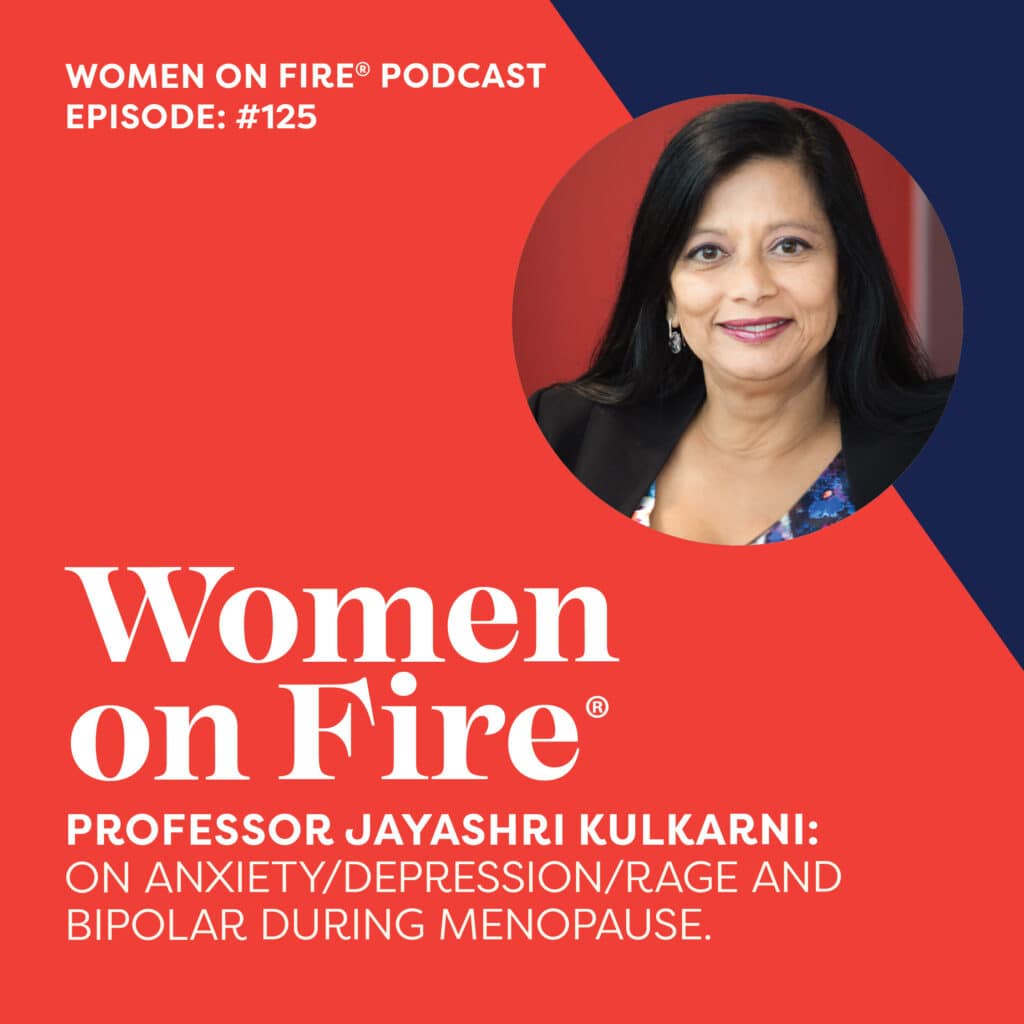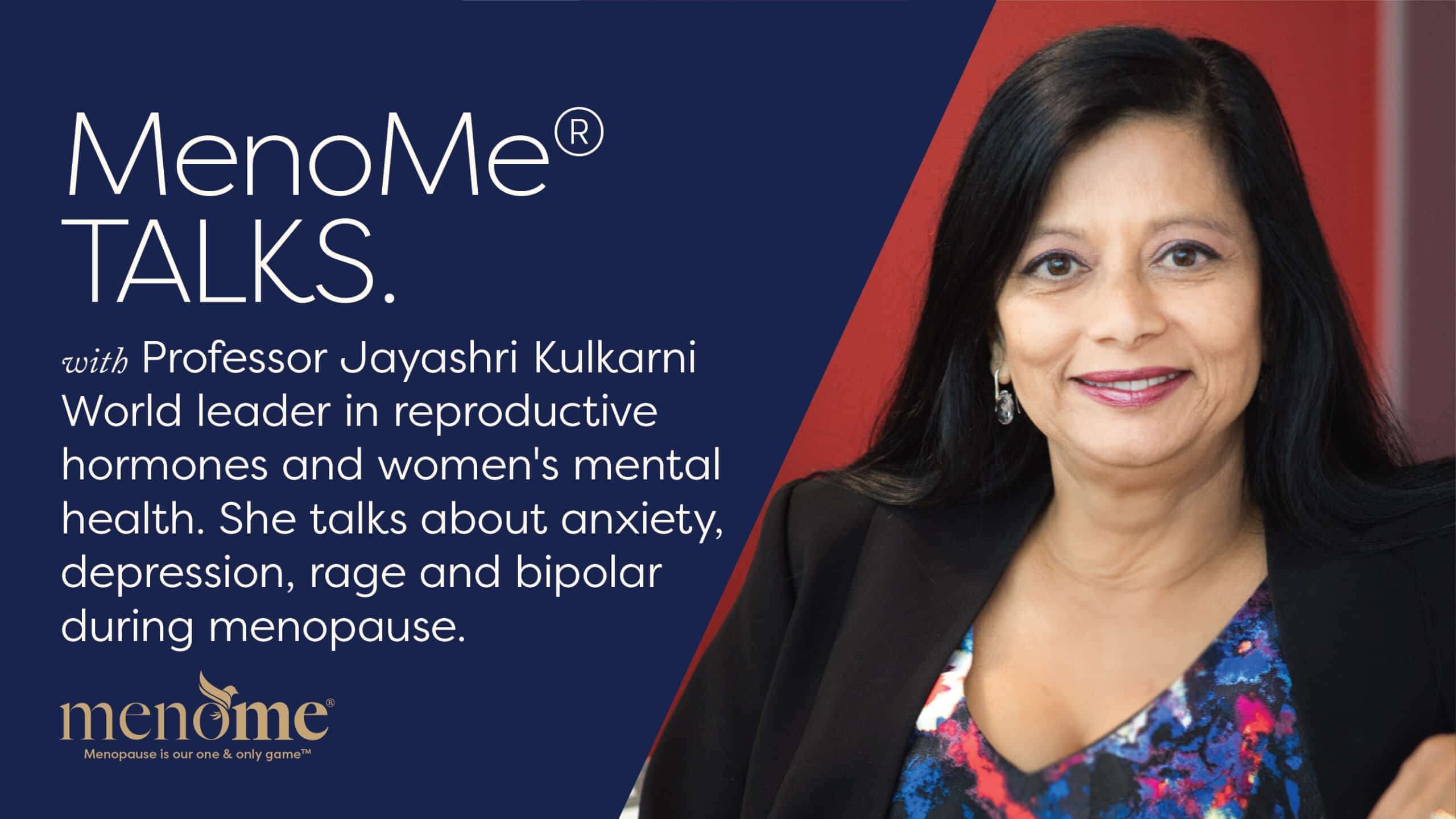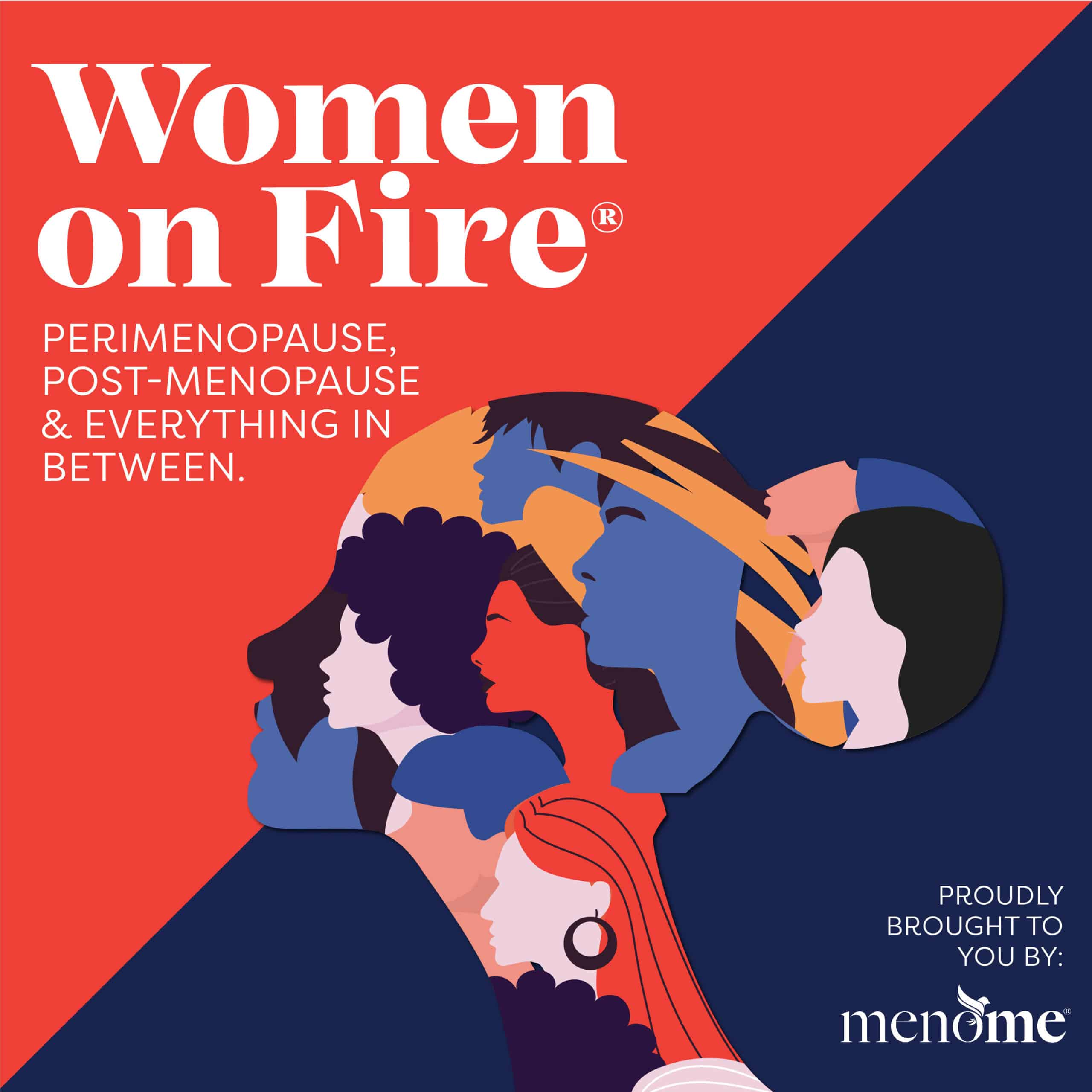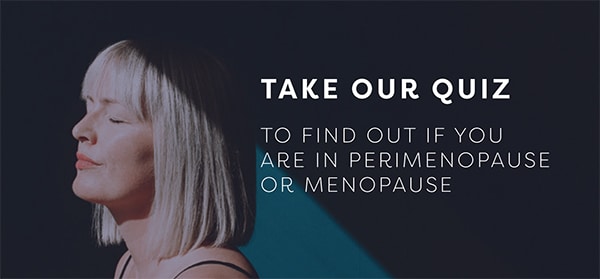Professor Kulkarni received an Order of Australia (AM) in 2019 for her services to Medicine. In 2024, she received two prestigious awards from The Royal Australian and New Zealand College of Psychiatrists (RANZCP): the Ian Simpson Award for “the most outstanding contributions to clinical psychiatry through service to patients and the community” and the RANZCP Senior Research Award, for “the most significant contribution to psychiatric research in Australia and Aotearoa New Zealand over the preceding five years”.
As you can imagine Professor Kulkarni is a very busy woman and her knowledge and wisdom is sought after so we hope you (and your GP) gain a lot from this episode.
Podcast Interview
In this episode, we talk about:
- About Professor Kulkarni(1:03)
- The link between reproductive hormones and mental health (4:44)
- Questionnaire for you on depression in menopause (5:19)
- Menopause depression is different – what are the signs? (5:29)
- The statistics – this is a significant time of mental health change for many women. (7:25)
- Let’s not forget the men because this is everyone’s business (9:30)
- Menopausal mood disorder and the brain (10:45)
- Beware of misdiagnosis (12:20)
- The link between hormones, the brain and menopause (14:47)
- We need to re-look at the way society looks at menopause (16:22)
- Please don’t stigmatise women who struggle (18:57)
- Know your numbers ladies (20:37)
- Taking the holistic approach to menopause (21:19)
- Make your needs known loudly and assertively (24;15)
- Blood tests can’t show what’s happening in the brain (24:43)
- Women are very good at knowing what is going on in their bodies (25:20)
- Message for GPs and women who are aged around 40 (26:08)
Episode Resources:
- HER Centre Australia
- Get MENO-D: a rating scale to detect menopause in depression here
Video Version
Transcript
Jenna
You’ve done groundbreaking research on the link between reproductive, women’s reproductive hormones and mental health. We support women in perimenopause, menopause, and postmenopause. And it seems to be, if you’ve had a mental health issue before, it can come back magnified or it can raise its head with loss of confidence, anxiety, panic attacks. Has your work evidenced this?
Professor Kulkarni
Yes, and in fact, I’ve developed a questionnaire which is validated and published and it exactly lists these symptoms because menopausal depression is different to menopause or to non -menopausal depression. That’s in the sorts of depression that men experience or that younger women experience and what we’ve noticed is that from about 40 onwards women can present with, first of all:
Anxiety and panic attacks, then rage and they can gain weight which is a common feature as well. There’s also a change in sleep and these things happen first up but then can be followed by tearfulness as well as a real profound loss of energy, libido and self-esteem takes a beating as well. And…
…all of these things fluctuate as well. So the other weird part about this condition is that it’s not consistent. And so it can be that sometimes people have it for a week or two and then suddenly become fine. Then again, a week or two later, they get into the same mental health conditions. Over time, however, the episodes of feeling more normal tend to become shorter as this thing continues on, and becomes more and more severe. And we must not think that this is just a temporary condition or that it will just right itself because unfortunately, we do know that suicidal thinking can lead to suicide attempts and in the worst scenarios absolute tragedies with completed suicide. So this is a severe condition in some women, and I hasten to add that because we don’t want to be medicalising menopause and we know that many many women sail through menopause with no particular issues at all. It just so happens that some women have a really tough time and the percentage of how many women experience this is somewhere between 30 and 50 percent. So we’re not talking a small percentage but we are talking about A percentage. And some women really will not have any problems.
Jenna
That is quite high, isn’t it? Because I’ve heard the suicide statistic for women 45 to 54 is the most common age group for women, is that correct?
Professor Kulkarni
Yes. That’s correct. And that’s the Australian statistic as a cohort. So we’re not talking about absolute numbers, but as a cohort, women, middle-aged women are the second highest likely group to have high suicide rates of completion. The highest rate in Australia is men over 84 as a cohort. So, yeah, these are surprising statistics for many people. I think we don’t often talk about this. And I think there’s also a sense of minimising or somehow we’ve got ourselves into thinking that middle-aged women don’t matter. Or that, you know, that it’s sort of just a thing that all women go through menopause. So therefore grin and bear it or just pull up your socks and get on with it. There’s a whole lot of mythology about this area, but I want to make it clear to your viewers and listeners that in fact,
This is a significant time of mental health change for many, many women. And if you’re experiencing this, then you’re A, not alone, but B, you need to get some professional help because otherwise it can get out of control.
Jenna
So that’s what you would recommend going and seeking professional help?
Professor Kulkarni
Yes, absolutely. I think it’s also important to keep the conversations going because you learn a lot from peers, from other women who are going through it and from women who’ve been through it. So it is an important network, but also let’s not forget the menfolk because it’s important that this is not just seen as women’s business. This is everyone’s business because this is… somebody’s mum, somebody’s sister, somebody’s female work colleague, somebody’s partner and so on. So, you know, we need to get everybody understanding that this could be a really tough time for the middle-aged woman. She’s going to need support, she’s going to need understanding and she’s going to need accurate and appropriate treatment when necessary.
Jenna
So do you recommend that she shares what she’s experiencing with her friends and family also?
Professor Kulkarni
Absolutely, because otherwise people are sort of sometimes – particularly partners, romantic partners, whether they’re male or female – can scratch their heads going, what happened to the lovely woman that I’m used to being in a relationship with? She disappeared. I’ve got this person now who’s just really anxious or she’s raging and she’s angry about nothing much and she’s just not enjoying life and I don’t understand what’s happening. And there can sometimes be this sense the people who are close are the ones who perhaps cop the rage and are not sure what to do about it all.
Jenna
I’ve heard this termed menopausal mood disorder. Is that a term you would you recognise as well?
Professor Kulkarni
Yeah, absolutely. I mean, mood disorders as a clinical term is a big group, a big heading which encompasses depression. It encompasses the other side of depression, which is mania. It’s any sort of version of those. So you can get depression up and down, fluctuating. You can get mania or hypomania, which is a bit of mania. And these mood disorders are related to hormone fluctuations in the brain.
So we’ve got to remember that menopause hormone fluctuations are happening in the brain, often first before they happen in the body, but they are happening and they have an impact on all the brain chemicals and all the brain circuits. It’s not surprising that women at this stage of life struggle with maintaining their mood, their cognition, which is their capacity for higher thinking, their memory. All of that is important. We focus, when we say menopause, yeah, hot flushes, well, that’s not so bad. You just kind of wear thin pajamas or, you know, don’t sleep with a big heater on or something. But it’s so much more than that. The hot flushes are kind of at the end of this process. And many, many women deal with those quite easily. But what they cannot deal with is the awful despair and anger. And then also because of the fluctuating nature, that she’s okay today, she’s terrible next week, somehow many women get a diagnosis of bipolar disorder, which is the old term for manic depressive disorder. And then they get treated with a whole bunch of drugs that have side effects like antidepressants, antipsychotics plus mood stabilisers plus benzodiazepines like Valium and so on.
That then leads to a whole other range of problems because now you’ve got somebody who’s not themselves, it’s still not up to their full functioning because these drugs are not hitting the target and they’re giving them side effects. Such as weight gain. So this is a really difficult situation that many women find themselves in during the menopausal process. It’s not bipolar.
You know, it’s not going to present – bipolar disorder is not going to suddenly present – when somebody’s 50 and they’ve had nothing beforehand. That’s highly unlikely. So again, what sometimes people find is it’s the depression that making them feel sad and angry and tearful. But then in the fluctuations, they flip back to themselves and then they go, I’m back. And they’ll run around and do all the things they couldn’t do when they didn’t have energy and felt depressed. So someone will look at that and go, see, she’s manic, she’s running around and doing all this stuff. No, this is a different thing altogether. We’ve got to be careful. Yeah, we’ve got to be careful not to label misdiagnosed serious mental illness as this particular thing. This is a serious condition, but it has a different outcome.
Jenna
That’s quite dangerous.
Professor Kulkarni
And again, different forms of treatment. What we find is the best form of treatment for the woman who’s got severe depression that’s not responding to lifestyle changes is to actually think about hormone treatment, which one of my patients said, isn’t that obvious? You know, like if it’s a hormone problem, why wouldn’t you use a hormone treatment? She’s right. She’s damn right.
Professor Kulkarni
And in the field of psychiatry, would there be specialist menopause clinicians?
Professor Kulkarni
I wish there were. And that’s exactly one of the struggles we have. Because for a long, long time, and still, there’s a misbelief. People go, well, hang on. This is a mental illness. It’s the brain, you know? And what’s that got to do with menopause? So there’s this kind of odd separation of body and mind or brain. And we still operate in sort of odd silos of thinking.
The hormones don’t have anything to do with the brain because that’s all their reproductive hormones. It’s all about having babies and turning off the fertility at midlife. And yet the neuroscience evidence from animal studies and other studies are very clear that these hormones, estrogen, progesterone, testosterone, are potent brain steroids and they work really strongly in the brain first and then work on the body.
So that’s old-fashioned thinking but it’s still around and many clinicians still believe that menopause is all about the hot flushes and that’s about it. Or they minimise the mood they call it sort of mood swings or grumpiness or bothersome. Every time you talk about menopause someone brings out the word bothersome. It’s not used in any other part of medicine, but it is in menopause and it minimises the severe nature of some of the symptoms that some women experience to call it just bothersome.
So, there’s a whole range of things that we have to think again, refresh the way we look at menopause because we are unfortunately struggling for… the continuance of women who are experiencing these mental health conditions to stay in the workforce, to not drop their salaries and have then problems with superannuation and all of that. And, you know, your nation and our nation can’t afford for many, many women who are at the top of their game in whatever field they’re in to suddenly just leave because of the menopause depression. So it’s important we understand that adolescent children, sometimes, you know, the mum who’s going through menopause is not functioning as she normally would. And then their behaviour deteriorates or their outcomes in terms of navigating through turbulent adolescent issues becomes difficult without mum functioning as mum.
Often middle-aged women are responsible for the care of their elderly parents as well and they’re often senior managers in workforces or they’re in relationships. And we don’t want any of those things to be impaired for her. Plus, we also want to make sure she heads into old age in a good, healthy way, because that will make for a healthier old age and a more enjoyable time for her. And she’s damn well-earned it. That’s the other side of it. After all the… learning and working and all the things that go on in a woman’s life, she deserves to be able to sail through a healthy, happy menopause and healthy, happy older age.
Jenna
And you’re doing amazing work in this field in terms of enlightening and educating people about this, aren’t you?
Professor Kulkarni
Trying to, but you know, it’s always a struggle to get funding for research, always, and then we have to be able to convey the findings to the broader population. So I’m really grateful to people like you, Jenna, because in your vodcasts and other things that you do, you’re able to reach a whole lot of women who we can’t reach through publishing in scientific journals, which we have to do for credibility, but not everyone reads those articles. And there is a lot of mess and noise when you start talking about menopause because we’ve got the group who go, this is a normal natural process. What are you doing? Stop medicalising it and stop making out that it’s terrible, et cetera. And I’m not trying to, I still say most women will get through it and not have big issues. That’s great. But that’s not the women that I’m seeing in my clinic or that we’re trying to help.
We’re trying to talk about it and help this group of women who actually experience mental ill health quite significantly in their middle age. And as I said, it’s not a small percentage, but it is a percentage. So we mustn’t forget about the women who are very lucky and don’t have a problem. But those women should not stigmatise their lesser lucky sisters who are experiencing the problem. And that’s another issue, because we often get comments like, I didn’t have a problem, why are you making a fuss about it? So we’ve got to stop that. We’ve got to actually listen to each woman. And that’s the other part about what I really want to see happen, is that the woman’s voice, who’s experiencing the absolute mental ill health conditions related to menopause is strong and she stands up for.
Jenna
It is.
Professor Kulkarni
Right, this is what it is. It’s not bipolar disorder. Nor standard depression. I need and want a hormone strategy and I will work with you, the healthcare professional, to determine what the right type and the right dose is and I’ll take charge of my own health and follow-ups. Because it’s important that women have regular breast screening, pap smears or cervix screening, blood pressure checks. Somebody once said, every woman over 45 should know her numbers. So every woman should know her blood pressure, know her cholesterol levels, and continue to have good health measures. And it’s great. We live in countries that can afford to provide that. So we should make sure we all take advantage of that and that we remain in charge. So we can’t just kind of do a test and then just not worry about the result. We’ve got to chase it up and so on.
Jenna
Which is great and I think women are using their voices more and more, aren’t they?
Professor Kulkarni
And I also like the holistic approach. So, you know, you’re a coach in this area and I think it’s great to bring in healthcare and people who are part of healthcare but not direct nurses and doctors only. It takes a whole village, really does. And so, you know, to have somebody who’s an expert in exercise. What’s the right exercise for a menopausal woman who is gaining weight? Because that’s what the menopause hormone process are doing, but she’s trying her hardest to exercise and eat healthy. But a lot of the exercise programs are not made for women who are middle-aged women. And that’s a real problem because then she can get injured and that’s a difficulty, or feel shamed when a trainer is yelling at them and so on. I’ve seen that happen. Then she just retreats and she goes, I’m not doing that. So we need…
…a much more menopause, midlife focused exercise and eating well, because sometimes women due to weight gain will starve themselves and reason I’ve gained weight and I don’t know what’s going on. Well, the hormones are what’s going on. But, you know, she starves herself and then she gets more depressed because the brain needs fuel, needs good fuel.
So starving herself is not the answer. And I’ve seen that happen so many times when I’ve had women who say, I feel miserable. So I take a story about what are you eating? And it’s black coffee and a lettuce leaf. That’s terrible because, you know, she feels awful. The nutrients and all the rest of it are not happening. And the brain is just kind of shutting down and saying, no, I’m not doing the higher work that you need me to do. Not if you don’t feed me properly.
Or you get this fluctuation between black coffee and a lettuce leaf for two days and then suddenly it’s chocolate and hot chips and the worst things because it’s like what’s the point I didn’t lose any weight now I’m just going to splurge. So it’s important to understand weight gain during menopause. It’s important to understand body change in shape and size and so on and what’s healthy and what’s not healthy. But to keep a perspective, you are going to look different. We don’t look like we did when we were 19. And quite frankly, we wouldn’t want to. It’s also important to have that perspective. But there’s a whole village that’s needed to provide the care that each woman needs. And each woman will have a different set of needs.
Jenna
That’s very true. And it’s understanding a lot of the changes because the goalposts change.
Professor Kulkarni
Yes, yes and so there is a lot of noise in the discussion but I think if you’re suffering because of menopause changes then you’re suffering because of menopause changes. So you go and get help and you make your needs known loudly and assertively.
Jenna
Yeah, assertion I think is the thing because I hear from a lot of women that go and see their GP and they get fobbed off, told they’re too young, get a prescription for antidepressants and sent on their way.
Professor Kulkarni
Or they get a blood test and then the GP or other doctor will say look the blood tests are all normal. Well, of course, they’re normal you don’t have a tumour that’s creating a problem. The blood tests that are done take a sample from your arm and that is only going to tell you pretty much what’s going on in your body. It’s not going to tell you what’s happening in your brain. Unfortunately, we don’t have the technology to pick up on the fluctuations in the brain.
So don’t be misled by normal blood tests of hormone levels and so on. That doesn’t mean that everything’s fine in terms of menopausal process. I come back to it, women are very good usually at knowing what is going on in their bodies. Especially if they’ve had children, et cetera, they’re really attuned. But everyone as well is very attuned. They’ve had monthly cycles. They pick up on the variations in bloating or breast size or ankle swelling and all the rest of it. They know their bodies and they know their mental health in terms of what stresses are normal stresses and what are normal juggling things that one does. And this comes out of the blue. Like suddenly she’ll tell you, I just can’t do any of the things that I used to do. And it’s all happened really quickly, I don’t understand. I think it’s my hormones.
So when somebody says that, it’s really important that it’s heard because she’s right. Nine times out of 10, she’s right. And there’s no point in messing around with taking blood tests and saying, look, it’s all fine. What we would hope then that the primary healthcare practitioner, the general practitioner or the doctor can do is say, ‘right, what do you think is the best approach here?’ We could go down a hormone strategy, we could go down an antidepressant strategy, we can go down a counseling strategy, we can, you know, and just lay it out in terms of the palette of choice. Or we could go down natural medicines pathway and see what she wants to do because she may not want hormone strategies first up, she might want to try seeing what works – because it’s fluctuating. So some women will wait for a while to see if it’ll be manageable. And in some cases it is.
But if there’s ever suicidal thinking or really reaching the depths of despair, then I’d suggest that it’s really important that we think of a hormone strategy first and then maybe add in antidepressants down the track if that hasn’t worked.
Jenna
That’s amazing advice for people. And I know that you’re very busy. Have you written a book or have you got one coming?
Professor Kulkarni
I’m thinking about it. The problem I have is I’m so busy with treating very desperate women in the clinic. And this is why I’m so passionate about it because I’ve seen some terrible things happen to really, really amazing women whose lives have disintegrated. And I’m so keen to prevent that. And what’s frustrating for me is that there are solutions. This isn’t a condition where we don’t have treatments or we, you know, like there’s still molecules that have to be made into appropriate treatments or whatever. It’s not that. We actually have all the treatments available. We just need to deliver them to the woman who’s in despair. And it’s very frustrating for me when I see women who are getting antidepressant after antidepressant and then they’re told they’ve got treatment resistant depression.
This makes them feel like they’re resisting the treatment and it’s their fault that they’re not getting better. Or their partner leaves, their kids are in despair as well and then they get into trouble, they lose their jobs, they lose their finances, all sorts of complete downward spirals. And I just feel so sad because I think if only we could have intervened back there, then none of this would have happened.
So that’s my plea to the healthcare practitioners out there, listen, please think about the menopause when you’ve got a middle-aged woman in front of you. That’s it, a simple message. And to the middle-aged women out there, and I know you’ll hate this, but you know, we’ll start thinking about middle-age from about 40 onwards. For women who are in that bracket, think about menopause if you’re wondering why you’re getting more snappy or irritable, you’re not sleeping, you’re gaining weight and you’re starting to become tearful and you’re not able to concentrate and have a good memory. Think about menopause and take that thought to your health practitioner because we’ve got to do better for women.
Jenna
Yes, we do, don’t we? And that’s why I do the same thing, after my own experience, which I think a lot of us do.
Professor Kulkarni
Absolutely. Lovely to chat with you, Jenna. Thank you for having me on your on your vodcast. I’m sorry about the tech issues, but we’ve got there.
Professor Kulkarni
No, I’m sorry. Thank you so much. I feel very honoured that you have given us some of your precious precious time. Thank you.












